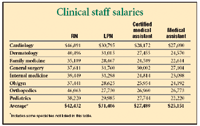Article
How do your staff salaries compare?
Check them against the results of this recent survey on clerical and clinical employee pay.

According to the survey, office managers' total compensation-including salary and benefits-averaged $60,883 in 2004, only slightly higher than in 2003, but up 8 percent from 1999. The data also show that primary care office managers earn considerably less than their peers who work for cardiologists, dermatologists, orthopedists, and ob/gyns.
When it comes to benefits, office managers received an average of $8,682, mostly in the form of medical insurance ($3,890) and retirement contributions ($3,156). About four out of five also reported receiving annual bonuses (included in the salary figures), typically given as a percentage of their salaries. Other findings: Only 14 percent of office managers have employment contracts, meaning that job tenure apparently depends on their employers' discretion as well as their performance.
As with office managers, clinical and clerical staffers who work for specialists generally receive higher salaries than those employed by primary care doctors.
Eighty-five percent of the respondents say their practices provide health insurance for clinical and clerical staff. However, only 36 percent report that the practice pays the total premium for that coverage, and only 21 percent say the practice pays all or part of the cost of health insurance for staffers' families.

When asked which jobs were most difficult to fill with qualified employees, the mostly-manager respondents said that it was toughest to get receptionists, medical assistants, and nurses. It's not clear, however, if that's the result of supply and demand or if it's because practice salaries aren't competitive.
David Scroggins, a practice management consultant whose Cincinnati-based firm, Clayton L. Scroggins Associates, serves about 900 doctors around the Midwest, has a bird's-eye view of medical office hiring problems. "In general," he says, "medical groups in our area can usually find experienced office managers and clinical staff. But the front-desk and back-office clerical employees are harder to find. There are plenty of recent high school graduates looking for those jobs, but not many good experienced people."





